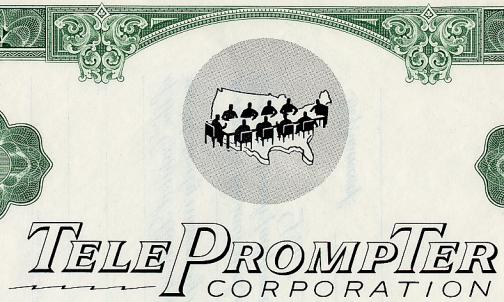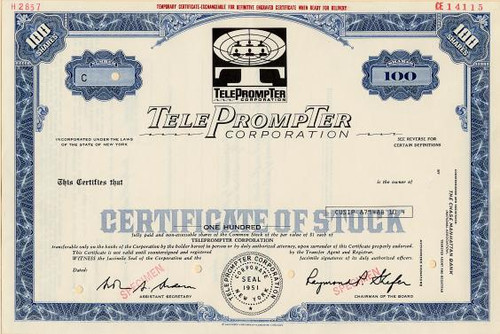Beautiful engraved specimen certificate from the TelePrompteTer Corporation . This historic document was printed by Security Bank Note Company and has an ornate border around it with a vignette of the company logo. This item has the printed signatures of the Company's President, Russell Karp and Secretary. 
Certificate Vignette The company got its start by constructing the first prompting machine out of a large suitcase with one side cut out. It weighed 40 pounds. Improved models were used for the first time on TV on a live CBS soap opera called The First Hundred Years. TelePrompTer's owners sold the prompting business in the early 1960s to pursue a promising new arena, cable TV. In the 1970s, the company grew into the largest multisystem cable operator in the country. After the company was on the brink of bankruptcy, Jack Kent Cooke became the CEO, Chairman of the Board at TelePrompTer around 1975. TelePrompTer got caught up into the same franchising frenzy that other cable's systems did in the early 70's, seeking franchises in major markets. Cooke stayed in New York City for about a year, after getting the company back on its feet with the marketing leadership of Marc Nathanson, who later founded Falcon Cable TV. Cooke then brought in Russell Karp as the chief executive and he remained the chief executive until the company was sold to Group W ( Westinghouse ). Raymond Philip Shafer (b. March 5, 1917 in New Castle, Pennsylvania) served as the 38th Governor of Pennsylvania from 1967 to 1971. He had previously served as Lieutenant Governor from 1963 to 1967. He was a national leader of the moderate wing of the Republican Party in the late 1960s. Early life and career Shafer was born in New Castle, the youngest of the five children of the Reverend David P. and Mina Shafer. In 1933, Shafer's father took a position at the First Christian Church in Meadville, Pennsylvania and moved the family. After finishing high school in Meadville, Shafer attended Allegheny College and later Yale Law School. There, several classmates like William Scranton and Gerald Ford would help shape his future political career. In 1942, Shafer entered the United States Navy as a Naval intelligence officer and later served on PT Boats. He would participate in over 80 combat missions during World War II on PT Boats as commanding officer of PT-359 and later as executive officer of Squadron 27. As Squadron XO, Shafer sailed aboard PT-375, one of the first PT Boats to penetrate the defenses of Manila Bay. Shafer earned the Bronze Star and the Purple Heart during his tour in the Pacific theater. Shafer returned to Meadville after the war and entered private law practice. His political career began in 1948 when he was elected District Attorney of Crawford County, a post he held until 1958. In 1959, he was elected to the State Senate. Governor of Pennsylvania In 1962, Republican gubernatorial candidate William Scranton tapped him as his running mate. Scranton had been Shafer's classmate at Yale and both were considered moderate to liberal Republicans. The Scranton/Shafer ticket won the election over the Democratic ticket led by Philadelphia Mayor Richardson Dilworth and Shafer became the Lieutenant Governor of Pennsylvania. Scranton was limited to one term under existing state law and Shafer was the obvious choice to succeed him as the Republican nominee. In the general election, he faced wealthy Philadelphia businessman Milton Shapp. The 1966 election was marked by tragedies. State Attorney General Walter Alessandroni, Shafer's running mate, was killed in an aviation accident during the campaign and Raymond Broderick was named to replace him on the ticket. Former governor David L. Lawrence collapsed and fell into a coma during a campaign appearance for Shapp. On election day, Shafer came out victorious by a margin of nearly a quarter of a million votes. As Governor, Shafer was best known for championing reforms to the state constitution. In 1963, then Lieutenant Governor Shafer had chaired a bipartisan committee to explore constitutional reforms. By the beginning of Shafer's term as Governor, a constitutional convention was meeting to overhaul state government. Shafer oversaw a massive expansion of Pennsylvania's highway system and dedicated several portion of the Interstate Highway System in the state. He was also the first governor to reside in the modern Governor's Mansion in Harrisburg. Large expenditures for these and other programs caused huge budget deficits. To balance the budget, Shafer sought Pennsylvania's first state income tax, a move that made him unpopular with many voters. Although the 1968 constitution allowed incumbent governors to run for reelection, Shafer was bound by the previous rules and was limited to one term. He campaigned for Raymond Broderick, his Lieutenant Governor, as his successor. Although Broderick publicly opposed a state income tax, he was unable to escape the shadow of Shafer, who had proposed it. The 1970 election saw a Democratic sweep with Milton Shapp elected Governor and Democrats gaining control of both houses of the General Assembly for the first time over 30 years. Post-gubernatorial career After leaving the state government, he became a major player in national Republican politics as the unofficial leader of the third largest Republican state party in the country. He gave the nominating speech for New York Governor Nelson Rockefeller at the 1968 Republican National Convention, although the delegates instead chose former Vice President Richard Nixon as the party's Presidential candidate. Many believe that Shafer's opposition to Nixon cost him the federal judgeship he was known to have desired. President Nixon appointed Shafer as chairman of the National Commission on Marihuana and Drug Abuse, also known as the Shafer Commission. He was criticized in this role by many conservatives after the panel recommended the decriminalization of marijuana use. Later, he served a brief sting as CEO of financially troubled TelePrompter company. Following Watergate, he returned to public service after being named special counsel to new Vice-President Nelson Rockefeller a position he held from 1974 to 1977. From 1977 to 1988 he was a partner with the accounting firm of Coopers and Lybrand. He also served briefly as president of his alma mater, Allegheny College, from 1985 to 1986. He has also served on the Council on Foreign Relations. A section of Interstate 79 in Pennsylvania is named "The Raymond P. Shafer Highway" after him as is a residence hall at Edinboro University of Pennsylvania.
About Specimens Specimen Certificates are actual certificates that have never been issued. They were usually kept by the printers in their permanent archives as their only example of a particular certificate. Sometimes you will see a hand stamp on the certificate that says "Do not remove from file". Specimens were also used to show prospective clients different types of certificate designs that were available. Specimen certificates are usually much scarcer than issued certificates. In fact, many times they are the only way to get a certificate for a particular company because the issued certificates were redeemed and destroyed. In a few instances, Specimen certificates we made for a company but were never used because a different design was chosen by the company. These certificates are normally stamped "Specimen" or they have small holes spelling the word specimen. Most of the time they don't have a serial number, or they have a serial number of 00000. This is an exciting sector of the hobby that grown in popularity over the past several years.

Certificate Vignette
About Specimens Specimen Certificates are actual certificates that have never been issued. They were usually kept by the printers in their permanent archives as their only example of a particular certificate. Sometimes you will see a hand stamp on the certificate that says "Do not remove from file". Specimens were also used to show prospective clients different types of certificate designs that were available. Specimen certificates are usually much scarcer than issued certificates. In fact, many times they are the only way to get a certificate for a particular company because the issued certificates were redeemed and destroyed. In a few instances, Specimen certificates we made for a company but were never used because a different design was chosen by the company. These certificates are normally stamped "Specimen" or they have small holes spelling the word specimen. Most of the time they don't have a serial number, or they have a serial number of 00000. This is an exciting sector of the hobby that grown in popularity over the past several years.








